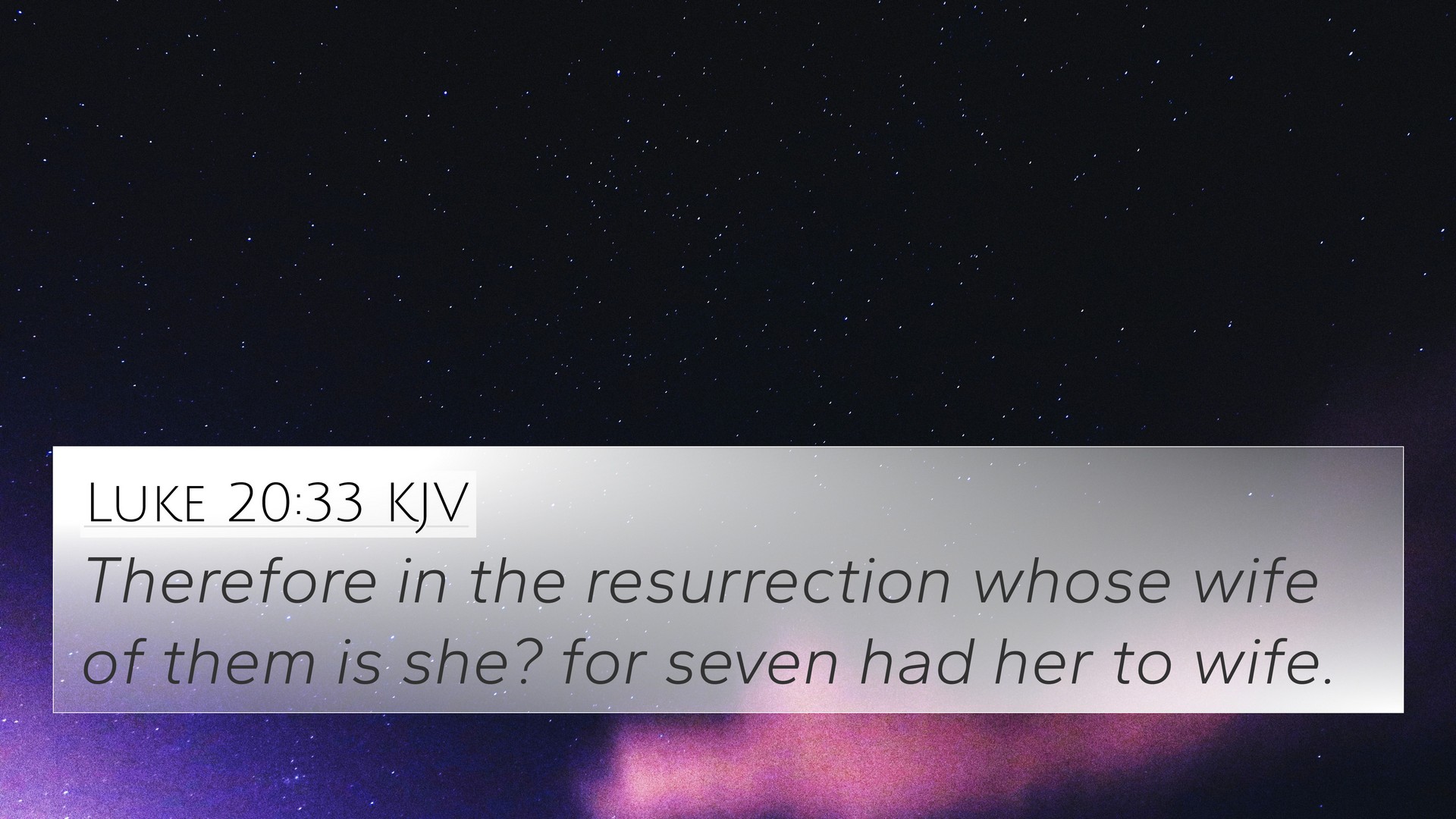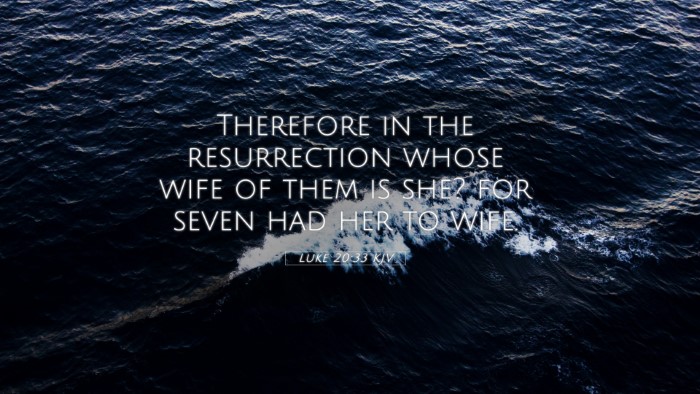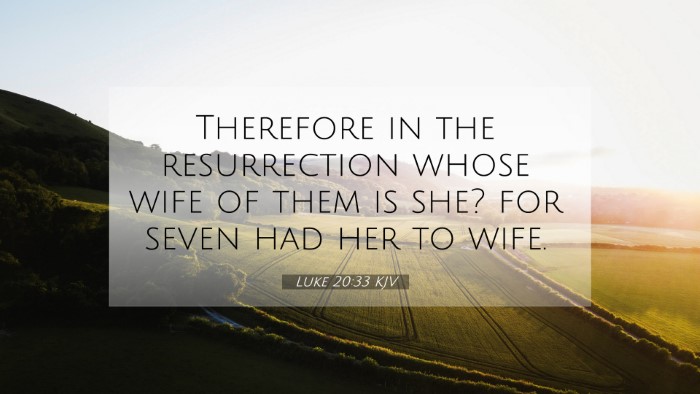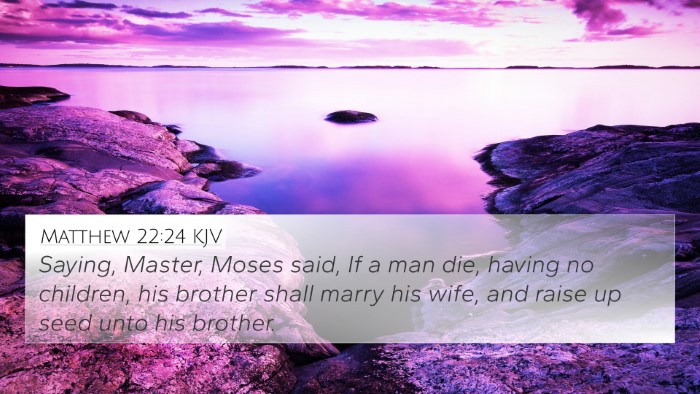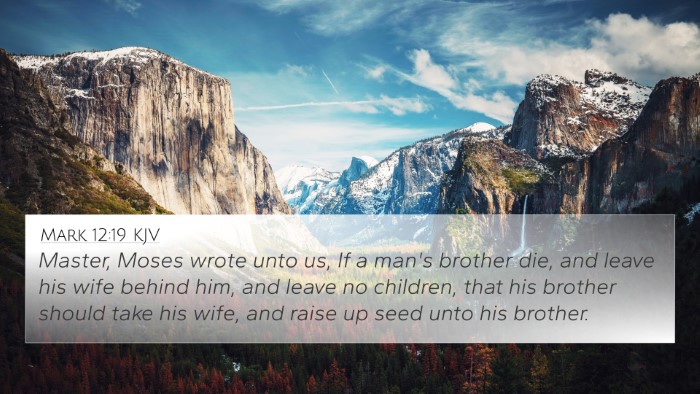Understanding Luke 20:33
Verse: Luke 20:33 states: "Therefore in the resurrection, whose wife of them is she? For seven had her to wife."
This verse appears in a context where the Sadducees question Jesus regarding the resurrection. Their inquiry targets the Levirate marriage law, which stipulates that if a man dies childless, his brother must marry his widow to preserve his lineage. The Sadducees present a hypothetical scenario with a woman who had been married to seven brothers, challenging the notion of resurrection and the nature of life thereafter.
Commentary Insights
Matthew Henry's Commentary
Matthew Henry emphasizes the absurdity of the Sadducees' question, indicating that it is rooted in their disbelief in the resurrection. He discusses how their reasoning is limited to earthly relationships, failing to grasp the transformed state of existence in the resurrection.
- The Sadducees sought to entrap Jesus.
- They misunderstood the nature of resurrected life.
- Heavenly citizenship transcends earthly institutions.
Albert Barnes' Notes
Albert Barnes elaborates on the legal context underpinning the question posed by the Sadducees. He explains that their query aims to illustrate what they believe to be the contradictions inherent in the resurrection. He highlights that Jesus' teaching reveals the permanence of the resurrected state, where previous familial roles and responsibilities are transformed.
- Focus on the resurrection's transformative power.
- Emphasis on the inadequacy of human reasoning against divine truth.
- In the resurrection, earthly obligations hold no power.
Adam Clarke's Commentary
Adam Clarke offers a theological perspective, asserting that the inquiry indicates the Sadducees' lack of knowledge about God’s power. He notes that their question reflects a misunderstanding of relationships after resurrection, stating that in the afterlife, those who rise are "equal unto the angels." Clarke points out that resurrection signifies a divine transformation that redefines worldly marriages.
- Recognition of God's omnipotence in resurrection.
- Transformation of human relationships in the afterlife.
- The assertion that angels do not engage in earthly marital bonds.
Thematic Connections and Cross-References
Luke 20:33 can be linked thematically to various other scripture passages that explore resurrection, marriage, and afterlife realities. Below are notable cross-references:
- Matthew 22:30: “For in the resurrection they neither marry, nor are given in marriage, but are as the angels of God in heaven.”
- Mark 12:25: “For when they shall rise from the dead, they neither marry, nor are given in marriage; but are as the angels which are in heaven.”
- 1 Corinthians 15:42-44: “So also is the resurrection of the dead. It is sown in corruption; it is raised in incorruption: It is sown in dishonour; it is raised in glory...”
- Philippians 3:20-21: “For our conversation is in heaven; from whence also we look for the Saviour, the Lord Jesus Christ...”
- Romans 6:5: “For if we have been planted together in the likeness of his death, we shall be also in the likeness of his resurrection.”
- Revelation 21:4: “And God shall wipe away all tears from their eyes; and there shall be no more death, neither sorrow, nor crying, neither shall there be any more pain...”
- Luke 14:14: “And thou shalt be blessed; for they cannot recompense thee: for thou shalt be recompensed at the resurrection of the just.”
Conclusion
Luke 20:33 invites readers to reflect on the nature of life after death and highlights the limitations of human understanding regarding divine matters. The insights from Matthew Henry, Albert Barnes, and Adam Clarke collectively deepen our understanding of the resurrection and its implications for human relationships. It underlines the significance of scriptural cross-referencing, allowing believers to explore interconnected themes throughout the Bible.
